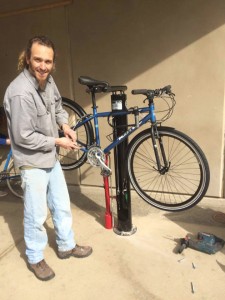
After a grueling Winter, the CobBikes have finally returned to their rack, and they will stay there for the rest of the semester – rain, shine or even snow. Dr. Ken Foster, chair of Concordia’s Sustainability Council, and Kim Haley, a Sustainability intern, said they have some plans in mind for the popular set of bikes.
Using Concordia’s sustainability fund, Foster hopes to install a shelter for the bikes as well as a Fixit Station made by Dero, a company that provides shelters, bike racks and more.
These items will be installed late this summer.
The Fixit Station will include an air pump, Philips and flathead screwdrivers, 2.5, 3, 4, 5, 6, and 8 mm. Allen wrenches, a headset wrench, pedal wrench, 8, 9, 10, and 11 mm. box wrenches and two tire levers – most everything needed for basic maintenance.
Students can use the Fixit Station to care for their personal bikes as well, which may need similar repairs due to heavy use.
Haley repaired most of the CobBikes last semester and found that some bikes needed more repair than others. She hopes to keep data on the bikes to see why some bikes are checked out more than others and eventually implement a system to balance the use of the bikes.
“I just want to make sure the bikes have the longest life they can,” Haley said.
No changes have been made to the system in which students may check a CobBike out. Students should still visit the circulation desk at the library to rent a bike. Students can keep the bike for four hours or, if needed, the bike rentals can be renewed over the phone.

The first time students check out a CobBike they will be asked to review and sign a sheet that outlines the policies of using a CobBike. This form acts as a waiver as well.
Haley worked with Foster to create a brief half-sheet sized survey for students to fill out after they use one of the CobBikes to look for suggestions on how to improve the service.
“Its such a new program that we’re still trying to figure out the best amount of (rentable) time,” Haley said. “We’re really open to suggestions.”
Haley also said there is a possibility in the future for different styles of bikes to be added for a variety. She encourages students to use the bikes freely to gauge what the system needs.
“We have to continue the program for a full year to see what the patterns are and decide if we need more bikes,” Foster said.
“I think it’s a good program and supporting it by using them is beneficial for our school,” Haley said.

